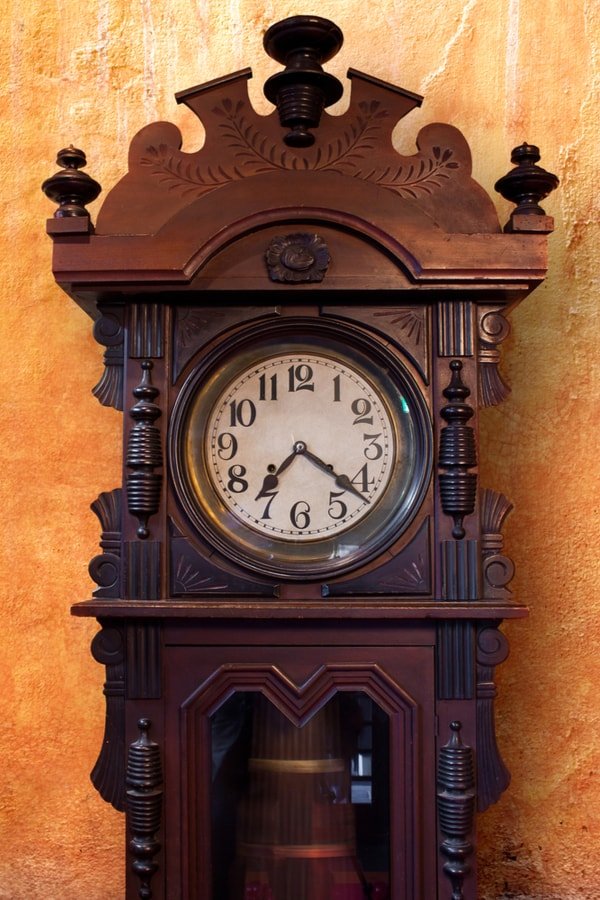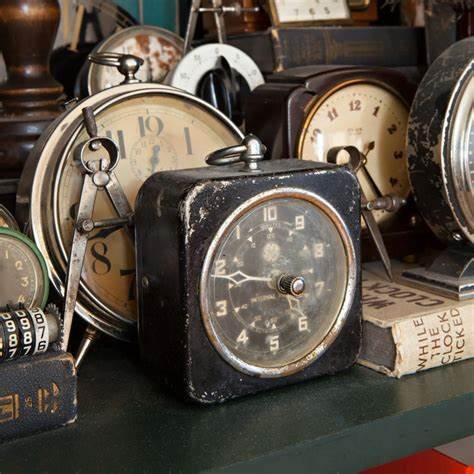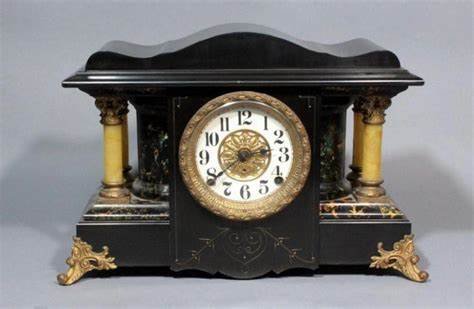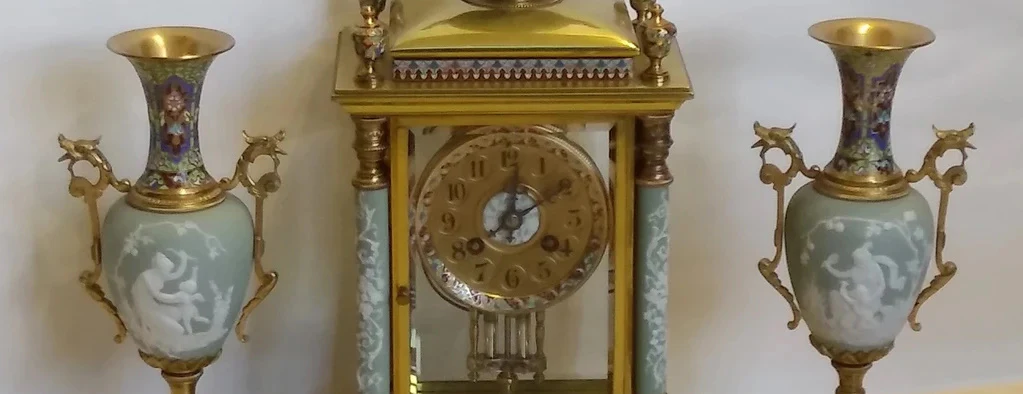Antique clocks are more than just timepieces; they are treasures that carry historical significance and artistry. Preserving their value requires careful attention and regular maintenance. If you own or plan to collect antique clocks, here’s a guide on how to care for them properly.
1. Regular Cleaning and Dusting
Dust can accumulate on the surface of your clock, affecting its appearance and functionality. Regular cleaning is essential to maintaining its value.
- Avoid Harsh Chemicals: Use a soft, dry cloth to wipe the clock. Avoid using any harsh cleaning agents as they can damage delicate surfaces.
- Clean the Glass: The glass covering the clock face should be cleaned gently using a soft cloth and mild glass cleaner.
In summary, regular dusting helps maintain the clock’s appearance while protecting its intricate details.
2. Keep the Clock in a Stable Environment
Antique clocks are sensitive to changes in temperature and humidity. Extreme conditions can cause damage to the clock’s internal mechanisms and wooden casing.
- Temperature Control: Keep the clock in a room with stable temperatures. Avoid placing it near heat sources or direct sunlight.
- Humidity Levels: Ensure the room has a moderate level of humidity. Excessive moisture can cause rust and warping, while very dry air can crack the wood.
In short, maintaining a stable environment will help prevent long-term damage to your clock.
3. Regular Winding and Operation
Clocks are designed to run, and keeping them operational helps maintain their internal mechanisms.
- Winding: Wind the clock regularly, following the manufacturer’s instructions or recommendations for your specific model. Over-winding can cause damage.
- Check Timekeeping: Ensure that the clock is keeping time accurately. If it starts to lose or gain time, it may need professional attention.
In brief, operating the clock as intended helps it function smoothly and prevents the mechanisms from seizing.
4. Inspect the Clock Mechanism
The internal workings of your antique clock, such as gears and springs, require periodic inspection to ensure proper function.
- Look for Wear: Watch out for signs of wear and tear, such as bent gears or loose parts.
- Professional Checkups: Have the clock inspected by a professional clockmaker if any issues arise. Regular servicing can prevent small problems from becoming bigger ones.
To sum up, regular inspections keep the clock’s mechanism in good working order.
5. Protect the Clock’s Finish
The finish on your clock contributes to its aesthetic value and helps preserve the underlying material.
- Polishing: Use a high-quality furniture polish that’s safe for antiques. This helps maintain the clock’s shine and protects the wood.
- Avoid Water: Water can damage the finish and cause wood swelling. Be careful not to spill any liquids near the clock.
In short, taking care of the clock’s finish will preserve its beauty and prevent damage.
6. Store Safely When Not in Use
If you’re not displaying your antique clock, proper storage is key to maintaining its value.
- Store Upright: Clocks should be stored in an upright position to avoid damage to the internal mechanisms.
- Cover for Protection: Use a soft cloth or cover to protect the clock from dust and accidental scratches while in storage.
In summary, proper storage prevents unnecessary damage and keeps your clock in pristine condition.

7. Seek Professional Restoration When Needed
If your clock has suffered significant wear or damage, professional restoration may be necessary to restore its value.
- Find an Expert: Always seek help from an experienced antique clock restorer who understands the mechanics and historical value.
- Avoid DIY Repairs: Attempting to fix complex issues yourself may lead to further damage and reduce the clock’s value.
In short, professional restoration ensures your antique clock is well-cared for without compromising its historical significance.
Conclusion
Preserving the value of your antique clocks requires careful cleaning, environmental control, regular operation, and professional maintenance. By following these tips, you can keep your clocks in excellent condition and maintain their value for future generations. Whether you are a seasoned collector or a beginner, proper care will ensure your antique clocks remain treasured timepieces for years to come.





**mind vault**
mind vault is a premium cognitive support formula created for adults 45+. It’s thoughtfully designed to help maintain clear thinking
**prostadine**
prostadine is a next-generation prostate support formula designed to help maintain, restore, and enhance optimal male prostate performance.
**gl pro**
gl pro is a natural dietary supplement designed to promote balanced blood sugar levels and curb sugar cravings.
**breathe**
breathe is a plant-powered tincture crafted to promote lung performance and enhance your breathing quality.
You’ve explained this better than anyone else I’ve read.
Really well-structured and easy to follow.
Can you be more specific about the content of your article? After reading it, I still have some doubts. Hope you can help me. https://www.binance.com/register?ref=IHJUI7TF
I don’t think the title of your article matches the content lol. Just kidding, mainly because I had some doubts after reading the article. https://www.binance.com/register?ref=IXBIAFVY
Jiliaisa offers really awesome bonuses. Great games too! Give it a shot. You can find it at jiliaisa.
Can you be more specific about the content of your article? After reading it, I still have some doubts. Hope you can help me.
Ê mấy ông iOS user, nghe nói có link tải 88vin ngon nghẻ cho iPhone nè. Test thử xem sao nha! Find it here: tai 88vin.link ios
Denn durch das neue Gesetz sind nur noch virtuelle Automatenspiele, welche sonst als Online Spielautomaten bezeichnet
werden, erlaubt. Am härtesten hat es wahrscheinlich die Spielauswahl für legale Online Casinos getroffen. Im
Gegensatz zu früher gilt diese Glücksspiel-Regulierung jetzt
in ganz Deutschland für alle Online Glücksspielanbieter.
Denn diesmal schafften es alle 16 Bundesländer gemeinsam eine Regulierung für
Online Glücksspiele auf die Beine zu stellen. Damals wurden Online Casinos noch verboten in Deutschland, obwohl
es schon hunderte Seiten für deutsche Spieler gab. So können Sie schneller das gewünschte Internet Casino für Ihre persönlichen Vorlieben aus unseren Ranglisten auswählen und sich
dort jeweils den attraktiven Willkommensbonus holen.
Und mit den “besten” meinen wir, dass diese Plattformen sicher sind,
viele Promotionen bieten und über schnelle Zahlungsmethoden verfügen. Nutzen Sie unsere innovativen Tools und Funktionen, um eine selektive Auswahl
der besten Online-Glücksspielseiten in Deutschland zu finden. Alle hier empfohlenen Spielotheken sind von der GGL lizenziert.
Um die optimale Spielbank zu finden, ist es wichtig, auf eine seriöse Lizenzierung und positive Nutzerbewertungen zu achten. Die Wahl der Top Casinos online hängt stark von Ihren individuellen Vorlieben und Anforderungen ab.
References:
https://online-spielhallen.de/wildz-casino-erfahrungen-ein-umfassender-uberblick/
Rooster.Bet Casino bietet eine kostenlose App im Google Play Store an. Im Falle einer Bankauszahlung
erwarten Sie Ihr Geld innerhalb von 3 Tagen. Rooster.Bet bietet allen Spielern Fiat-
und Krypto-Zahlungsmethoden an. Rooster Bet bietet ein fesselndes und eindringliches
Erlebnis für Sportwetten. Der Buchmacher bietet eine breite Palette
an Sportmärkten. Beim Drehen des Rades gewinnen Sie bis zu 5.000 €.
Klare, einfache Navigation für schnellen Zugriff auf Ihre Lieblingsspiele
Ich bin Rolf Brinker und bei Playcasino.com als erfahrener Experte bereits seit 2022 zuständig für den deutschsprachigen Markt.
Wie setzt sich der Willkommensbonus im Rooster Bet Casino zusammen? Mit
2.500€ fällt der Willkommensbonus auch nur halb so
hoch aus wie bei Rooster Bet. Einen telefonischen Support bietet das Rooster Bet Casino
derzeit nicht an. Das Rooster Bet Casino bietet keine dedizierte
App an.
Die Freispiele gelten für den beliebten Spielautomaten „Book of Tut“ von Pragmatic Play.
Regelmäßige Turniere in der VIP-Liga bieten die
Chance auf noch mehr Zusatzgewinne. Bestandskunden erhalten im Rooster Bet Casino jeden Freitag
einen Reload Bonus in Höhe von 50 % bis zu maximal 200 Euro + 50 Freispiele.
Die dritte Einzahlung bringt mit dem Rooster Bet Bonus
Code „ROOSTER3“ einen 50 % Bonus bis zu 1.500 Euro und
50 Freispiele. Wenn Kunden von Rooster Bet bei
ihrer zweiten Einzahlung den Bonus Code „ROOSTER2“ eingeben, erhalten sie einen 50 % Bonus
bis 1.000 Euro und 50 Freispiele. Bei Einzahlung Nummer 1 bekommen Spieler einen 100
% Bonus bis zu 1.000 Euro und 100 Freispiele.
References:
https://online-spielhallen.de/avantgarde-casino-auszahlung-im-detail-was-sie-wissen-mussen/
Games like Jacks or Better, Deuces Wild, and Joker Poker are popular among Australian players who enjoy skill-based gameplay.
Many sites also feature variations of these games, such as European vs.
American roulette or multi-hand blackjack, keeping the experience fresh and engaging.
Australian players can enjoy classics like blackjack, roulette,
and baccarat, each offering different rules, strategies, and betting styles.
The online casino industry is getting more and more competitive each year.
We look at terms, max bonus, wagering, no deposit bonuses and many more factors.
In this list we have filtered out the absolute best Australian casino bonuses based on our algorithm.
If crypto casino gambling sounds intriguing to you, you now know exactly which category of top Australian online casinos you should go for!
Instead of being islands unto themselves, Australian online casino sites today actually let you play a few multiplayer games as well.
Most of us would happily redeem a sturdy Australian casino bonus and a few free spins on top every time that we visit
Aussie online casinos.
Access to this premium gaming library requires
only a minimum deposit of $30, making world-class entertainment accessible to players at every level.
Our community thrives because we’ve eliminated the uncertainty that plagues other platforms, replacing it with genuine
clarity that empowers players to make informed decisions about their gaming journey.
To see what our players say about their experiences, visit askgamblers.com – a
trusted source for authentic player reviews and casino
insights. We believe in empowering players with control over their gaming experience while providing immediate access to professional assistance
when needed. The platform has earned multiple industry
accolades, including several “Best Casino” awards from AskGamblers,
testament to its commitment to excellence.Australian players can enjoy complete peace of mind with
the casino’s advanced SSL encryption technology safeguarding
all personal and financial information. Enjoy over 5,000 high-quality games, secure
payment options, and a royal gaming experience fit for kings and queens!
Register, log in, fund your account, and begin your royal adventure
whenever you’re ready. Just keep in mind that demo play does not generate real winnings.
Simply register an account, confirm you’re 18+, log in, and start exploring demos at
no risk. King Billy’s mobile site is smooth,
intuitive, and designed for on-the-go entertainment.
References:
https://blackcoin.co/discover-the-thrilling-world-of-online-gambling/
A solid online casino should also reward regular players with VIP perks, cashback, and
reload bonuses. Simply open Rocketplay in your mobile browser
and you’ll get the full experience – slots,
table games, live dealers, all optimised for your screen. From slots
and table games to live dealer experiences, our
app offers hundreds of entertainment options from top providers.
Our state-of-the-art platform brings the excitement of a real casino directly to your screen, offering a seamless and immersive
gaming experience for players of all skill levels.
RocketPlay Casino provides a well-balanced gaming
experience for Australian players, featuring a massive game
library, generous bonuses, and flexible payment methods.
Live dealer games stream in HD quality even on mobile connections, ensuring that
players can enjoy the full casino experience regardless of their device choice.
They’re ideal for beginners or nostalgic players who enjoy the
elegance of old-school slot design. Rocketplay’s collection includes both revamped classics and modern versions with extras like auto-play and mobile
optimization. They’re perfect for players who prefer straightforward
sessions with smaller, more frequent wins. Rocketplay rewards loyal players with a 10-level VIP program that starts
as soon as you register.
References:
https://blackcoin.co/roo-casino-quick-overview/
Crypto users can use BTC, BCH, and LTC, among others, and will enjoy faster transaction times for deposits
and withdrawals. Let’s take a closer look at what each one
has to offer. However, professional gamblers
who treat gambling as a business may be subject to taxation. Each state and territory has its own gambling regulations,
impacting where and how different forms of gambling can be accessed.
Online gambling in Australia is legal—but heavily regulated.
Choose your preferred withdrawal method (some methods are deposit-only).
This is great for players because you can use these bonuses to play for
longer and get the chance to win real money. AU online casinos use bonus rewards to set themselves apart
from the rest. Online casino bonuses are important to the players
and the casinos. The AU online casinos we have recommended have libraries full of different
types of online pokies. So, it’s no surprise that the
best online casino that accepts PayPal offers a fully optimised mobile platform for seamless
gameplay, accessibility and ease.
Based on our past experience, options like
bank cards or MiFinity are known to reliably process withdrawal requests
within a timeframe of 24 to 72 hours. The top Australian casinos always have
a variety of roulette tables to satisfy all appetites, including American, European, and French tables.
With new versions that build on the classic roulette game,
variants like Auto Roulette 500x and VIP Auto Roulette help keep this game’s popularity even in the digital gambling era.
Some versions follow the classic blackjack structure,
others come with alternative side bets and house edge, so read
the game’s rules closely before playing. We can say the average number of online pokies is between 4,000
and 10,000, and we wouldn’t be exaggerating. But the website has
a register of official URLs and links to licensed operators, which we use to distinguish between an unregulated and a regulated Australian casino online.
References:
https://blackcoin.co/just-casino-australia-login-your-ultimate-guide/
Your point of view caught my eye and was very interesting. Thanks. I have a question for you.
paypal online casino
References:
http://www.chinajobbox.com
online betting with paypal winnersbet
References:
workbay.online
online casinos that accept paypal
References:
https://renbrook.co.uk
best online casino usa paypal
References:
recruit.brainet.co.za
online casino for us players paypal
References:
http://aanline.com/eng/board/bbs/board.php?bo_table=free&wr_id=381646
Alright, ph987. Let’s be honest, it’s a mixed bag. Some things are great, others…not so much. They need to step up their game.
**backbiome**
backbiome is a naturally crafted, research-backed daily supplement formulated to gently relieve back tension and soothe sciatic discomfort.
**vivalis**
vivalis is a premium natural formula created to help men feel stronger, more energetic, and more confident every day.
**glycomute**
glycomute is a natural nutritional formula carefully created to nurture healthy blood sugar levels and support overall metabolic performance.
**balmorex pro**
balmorex is an exceptional solution for individuals who suffer from chronic joint pain and muscle aches.
**aqua sculpt**
aquasculpt is a revolutionary supplement crafted to aid weight management by naturally accelerating metabolism
**synadentix**
synadentix is a dental health supplement created to nourish and protect your teeth and gums with a targeted combination of natural ingredients
**nervecalm**
nervecalm is a high-quality nutritional supplement crafted to promote nerve wellness, ease chronic discomfort, and boost everyday vitality.
**prostavive**
prostavive Maintaining prostate health is crucial for mens overall wellness, especially as they grow older.
**alpha boost**
alpha boost for men, feeling strong, energized, and confident is closely tied to overall quality of life. However, with age, stress, and daily demands
**yusleep**
yusleep is a gentle, nano-enhanced nightly blend designed to help you drift off quickly, stay asleep longer, and wake feeling clear
**prodentim**
prodentim is a distinctive oral-care formula that pairs targeted probiotics with plant-based ingredients to encourage strong teeth
**nitric boost**
nitric boost is a daily wellness blend formulated to elevate vitality and support overall performance.
**glpro**
glpro is a natural dietary supplement designed to promote balanced blood sugar levels and curb sugar cravings.
**mind vault**
mindvault is a premium cognitive support formula created for adults 45+.
**femipro**
femipro is a dietary supplement developed as a natural remedy for women facing bladder control issues and seeking to improve their urinary health.
Winvn14, alright! New site, new possibilities. Hoping for some good odds and a smooth experience. Let’s see if I can actually win on winvn14!
So, about link12bet. The link is working, everything seems as it should be. Can’t say I’ve used it extensively, but the initial look is promising. Maybe I’ll put more time into it later. link12bet
Yo, just checked out bk8link1. Seems like a solid option for some online fun. Definitely worth a look if you’re chasing those wins!
**finessa**
Finessa is a natural supplement made to support healthy digestion, improve metabolism, and help you achieve a flatter belly.
Can you be more specific about the content of your enticle? After reading it, I still have some doubts. Hope you can help me. https://www.binance.info/register?ref=IHJUI7TF
Thank you for your sharing. I am worried that I lack creative ideas. It is your article that makes me full of hope. Thank you. But, I have a question, can you help me? https://www.binance.com/ar/register?ref=53551167
I don’t think the title of your article matches the content lol. Just kidding, mainly because I had some doubts after reading the article. https://accounts.binance.com/register-person?ref=IXBIAFVY
Can you be more specific about the content of your article? After reading it, I still have some doubts. Hope you can help me.
Thank you for your sharing. I am worried that I lack creative ideas. It is your article that makes me full of hope. Thank you. But, I have a question, can you help me?